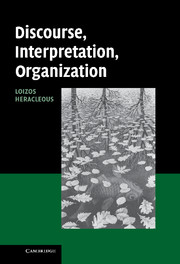Book contents
- Frontmatter
- Contents
- List of figures
- List of tables
- Preface
- 1 Images of discourse: interpretive, functional, critical, and structurational
- 2 Interpretive approaches to organizational discourse
- 3 Functional approaches: metaphor in organization change and development
- 4 Critical approaches: Michel Foucault's conceptions of discourse
- 5 A structurational approach to discourse
- 6 Analyzing discourse I: discourse as situated symbolic action
- 7 Analyzing discourse II: a tale of three discourses
- Index
- References
2 - Interpretive approaches to organizational discourse
Published online by Cambridge University Press: 22 September 2009
- Frontmatter
- Contents
- List of figures
- List of tables
- Preface
- 1 Images of discourse: interpretive, functional, critical, and structurational
- 2 Interpretive approaches to organizational discourse
- 3 Functional approaches: metaphor in organization change and development
- 4 Critical approaches: Michel Foucault's conceptions of discourse
- 5 A structurational approach to discourse
- 6 Analyzing discourse I: discourse as situated symbolic action
- 7 Analyzing discourse II: a tale of three discourses
- Index
- References
Summary
As discussed in chapter 1, interpretive approaches to organizational discourse view language as constructive of social and organizational reality, and seek to gain an in-depth understanding of this process and of the actors' own frame of reference. This chapter discusses the main tenets as well as analytical implications of five prominent interpretively oriented approaches to organizational discourse hermeneutics, rhetoric, metaphor, symbolic interactionism, and storytelling. Critical discourse analysis and the structurational approach, as further interpretively oriented approaches, are respectively discussed in detail in chapters 4 and 5.
Interpretivism and the Linguistic Turn
There is a broad range of theoretical approaches within the interpretive tradition characterized by varying ontological and epistemological positions (Burrell and Morgan, 1979). However, a key unifying factor is their focus on achieving a meaningful understanding of the actors' frame of reference, which Weber (1922) referred to as verstehen. In Weber's view, this ability and desire to achieve an in-depth, first-order understanding is what distinguishes the social from the natural sciences. Meaningful understanding is often contrasted with explanation (Ricoeur, 1991), the search for causal, law-like deterministic regularities as in the positivist tradition—a tradition based on the methodology and ontology of the natural sciences. This simple contrast, however, does not do justice to the potential for meaningful understanding and explanation to operate in a complementary manner (notwithstanding the debate on paradigm incommensurability).
At the outset we must be clear that interpretivism should not be equated with subjectivism.
Information
- Type
- Chapter
- Information
- Discourse, Interpretation, Organization , pp. 28 - 54Publisher: Cambridge University PressPrint publication year: 2006
References
Accessibility standard: Unknown
Why this information is here
This section outlines the accessibility features of this content - including support for screen readers, full keyboard navigation and high-contrast display options. This may not be relevant for you.Accessibility Information
- 2
- Cited by
